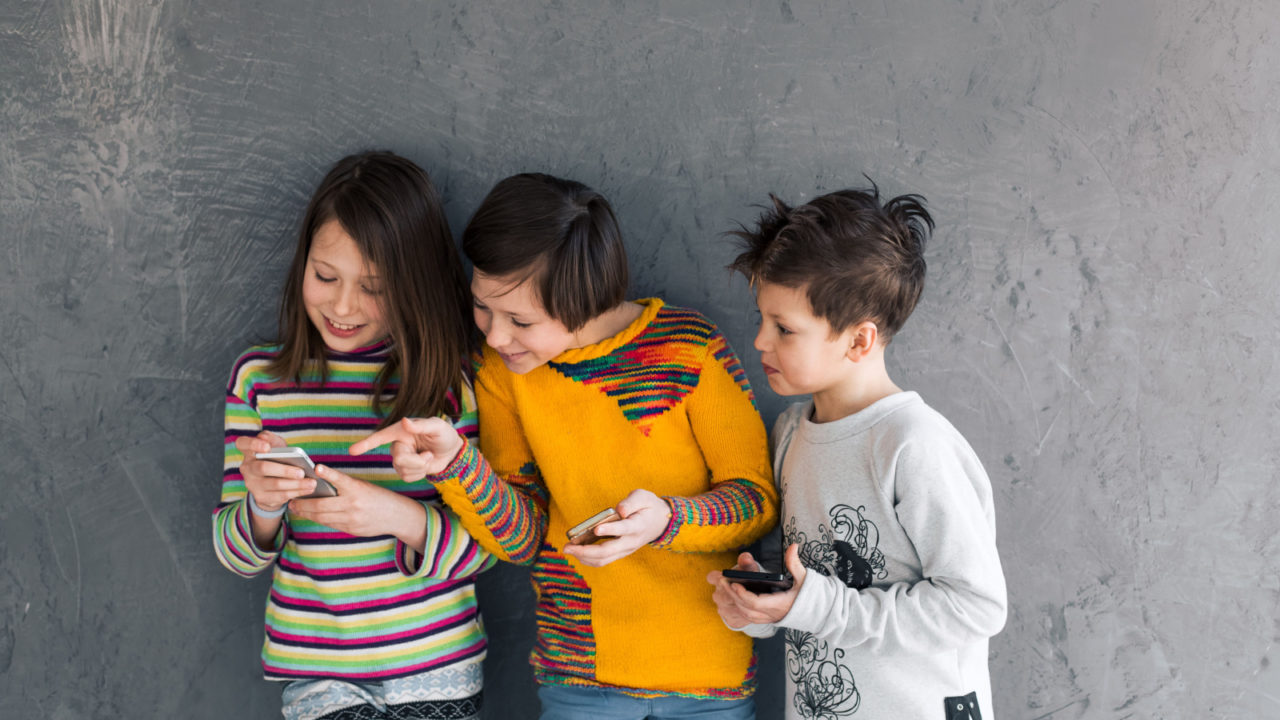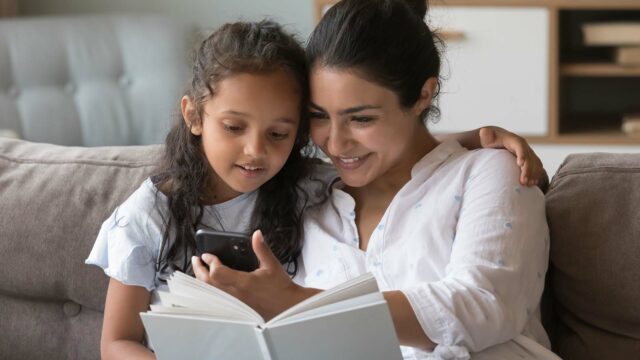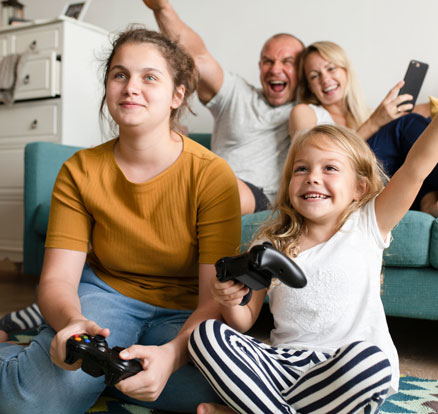
New survey: pressure and worries when children get mobile phones and start using social media
Norwegian parents give their children access to mobile phones and social media to avoid the children feeling excluded, but also for practical reasons. However, the role of parents is characterized by apprehension and uneasiness regarding children's screen use, but it becomes difficult to hold back when other children are allowed to use early.
Choose language in the Google-box below. Some translations may be flawed or inaccurate.
93 percent of all children between the ages of 9 and 11 have their own mobile phones (compared to 85 percent in 2014), according to a new survey from the Norwegian Media Authority (Medietilsynet). The survey contains qualitative interviews with 10 families about their children’s mobile phone use.
The parents primarily mention practical reasons for giving their child a mobile phone. Among other things, it makes it easier to have contact with each other, give messages and know where the child is.
Children, on the other hand, primarily want mobile phones to use the device for entertainment, gaming, social media, and creative activities. This may indicate a conflict of interest between the children and their parents’ wishes for mobile phone use, according to the report.
Another aspect is that children inherit mobile from a parent or older sibling. This can lead to children getting a mobile phone earlier than planned.
In addition to mobile phones, children often have access to other screens. For example, access to a smartwatch, tablet, and so on, before the children get their own mobile. Nearly eight out of ten children in grades 4-7 have access to tablets and their own home PCs, according to the Children and Media Survey 2022.
Everyone else is allowed
In the interview with the parents, it is clear that parents find it difficult to hold back when other parents open up access to mobile phones, apps, social media, and games.
– She got it when she turned eight. By then, almost everyone in the class had gotten it. She is the youngest in the class, and we were actually going to wait another year. But it felt like a pressure that she shouldn’t fall outside socially (mother of a girl, 11 years old).
The qualitative interviews revealed that some of the families had positive experiences with discussing the topic at parent meetings. Among other things, to expose the myth that everyone in the class is at one particular game.
The older the children, the higher the age that children and young people believe is the right time to get their first mobile phone:
- In primary school, more than six out of ten children believe that children should get their first mobile phone before the age of 9.
- In high school, only three out of ten think the same.
– One in the class got it when he was 6 years old. I don’t think it’s a good idea. You don’t really need a mobile phone when you’re 6 years old. I think there are a lot of kids who don’t quite do what they are supposed to do on their mobiles. Like searching for lots of weird stuff (boy, 12 years old).
Over half of the 10-year-olds are on social media
Half of the 9-year-olds and 56 percent of 10-year-olds are on social media (Children and Media, 2022). This is despite the fact that a limit of 13 years has been set in the Personal Data Act for the use of social media, and even though many social media set an absolute age limit for the use of their platform.
Having an open user on social media is far more common than having a private profile among younger children. However, the police often encourage children to have a private profile on social media to prevent online abuse.
Among girls who use social media, about one in four 9-10-year-olds publish videos they have made on TikTok, Snapchat, or Instagram, according to Children and Media, 2022. About 3 in 10 teenagers who use social media have shared something they have regretted later, and the proportion increases with age.
Exclusion without social media
In the interview rounds, the girls in particular said that they had experienced pressure from their friend circle to get certain apps and social media. They also felt left out when others talked about apps that they themselves were not using or had not been invited into chat groups.
– Now everyone has a user on Zoomerang so you can post videos, so I kind of want it, even though I don’t like it very much. I don’t like to show off myself, sort of. They talk about it a lot, and then I feel left out. But I also want it because everyone in the class talks about it (girl, 9 years old).
According to Children and Media 2022, more than four out of ten teenagers who use social media state that they would feel left out if they were not present on the same social media as their friends.
Parents are also positive about mobile
The interviews show that parents view their children’s mobile phone use both positively and negatively. However, it’s easy for it to become a “babysitter.” Others believe that children endure longer in situations where they would otherwise be bored.
Several also pointed out that mobile phones make it easier for children to keep in touch with friends.
Fear of foul language and bullying
When the children and parents were interviewed, several concerns came to light. Several mentioned that they had reacted to or worried about nasty messages in chat or social media. Some had experienced that someone else in the class had guessed their password and written nasty messages to others from their profile.
Others had even received nasty messages.
– He was called brain-damaged and a lot of other horrible names. He said he didn’t care much, but I got stressed and cried. I think such nasty comments are underestimated because they have such a huge effect on children. They will appear in adolescence and later (mother of a boy, 11 years).
The use of language and strong emotions in games was mentioned by several boy parents. Some of the parents observed a type of anger related to screen use that they didn’t see in other situations.
The Children and Media 2022 survey shows that:
- 30 percent of 9–10-year-olds have experienced someone writing a nasty comment to them online.
- 38 percent of 11–12-year-olds have experienced the same.
- 1 in 4 in this age group has experienced being banned from an online group.
Skeptical about school solutions
In the interview rounds, several parents were concerned about the technical solutions offered by the schools. For example, it is easy to guess other pupils’ usernames and passwords on Teams chat. It makes it easy to write nasty messages using others’ profiles.
Several parents also experienced that they lost control and the ability to regulate their children’s screen use as a result of the school’s practice of introducing tablets. Several also believed that the introduction of tablets has led to poorer learning in schools, and in the Parents and Media 2022 survey, it appears that less than half of the parents believe that children should receive tablets from school.
Harmful content
In the interviews, it is found that few of the children had seen violent or extreme content that had left an impression on them. The quantitative survey of Children and Media 2022 shows that half of the teenagers aged 13-18 have seen frightening or violent images/films online, for example of people harming other people or animals.
– That’s not all I’m happy about him watching. “Killer Clown” and all that. His elder brother had nightmares from it. I find it extremely difficult for us parents to regulate. They can apply for anything. I’ve seen his search history (mother of children 9 and 15 years old).
The requirement to be available at all times
In the interview rounds, it emerged that the girls in particular experienced social pressure to respond to messages quickly. They also talked about activities such as watching a movie, hanging out with friends, or sleeping were interrupted because they had to respond to messages.
The parents found that the older the children got, the more difficult it became to give them a break from their mobile phones.
Critical to screen use
In the interviews, some of the children pointed out that they perceived their own screen use as problematic. At the same time, such an opinion was more common in those families where the parents were also critical, and it could be characterized by the children repeating the parents’ statements. In other cases, the children seemed to have real, self-perceived feelings that they had become mentally or physically tired from too much screen use.
– All of a sudden, you’re just sitting there scrolling on TikTok for a very long time, instead of doing something beneficial. After all, scrolling and watching videos aren’t that useful. You don’t get much out of it, but it’s fun (girl 11 years old).
The Children and Media 2022 survey shows that:
- Almost 1 out of 10 boys aged 9-10 thinks they spend too much time gaming.
- Almost 3 out of 10 teenagers who use social media wish they were able to log out more often.
- The same proportion responds that social media causes them to sleep too little.
In the interviews, children and adults also pointed out that mobile phone use could affect the interaction in the family:
– I think it’s stupid that Mom and Dad have to use mobile phones so much for work. They have to write messages and stuff when we are together (boy, 12 years old).
In the interviews, the parents also expressed a wish that the children would spend more time on activities where they were physically together, used their bodies and played, “as it was before.”
– A friend used the phone a lot, and it was annoying sometimes. I think it’s more fun to be outside and play, but she would rather be on her phone (girl, 11 years old).
Several of the parents felt that they almost had to force their children to be out with others, especially during holidays and weekends. Parents fear that screen time will shift or stand in the way of time spent on family life and socialization, sleep, schoolwork, and physical activity.
Some of the parents also pointed out in the interviews that the children’s ability to retain interest and attention over time had been affected.
– I’m a little worried about this generation. I wonder what happens to their concentration, their ability to read a book or watch an entire film. Everything must go so fast; you must get to the point right away. When tension has to build up over a long period of time, they fall away. They’re so used to just: «No, I didn’t like that. Let’s move on to the next video,» (mother of a 10-year-old boy).
Some parents are also worried that screen use could affect their children’s social skills.
Different rules for time use
In the interviews, it was found that it was common to have rules for time spent on screens. It was also this aspect that created the most frustration and conflict in the families. The parents handled the regulation of time use in different ways. Some negotiated with the children, and others threatened to take away the mobile or access to the game console.
Several of the parents were worried about addiction. Several experienced that rules were set but then slipped out over time. In some families, screen time was used both as a reward when the children did something good, and other times as punishment.
Parental settings and age limits are complicated
In the interviews, most families had clear rules that parents had to approve of downloading apps, games, and social media. However, some found it difficult to familiarize themselves with parental settings. Others felt that parental settings were of little use as the children would find ways to circumvent these anyway.
Several of the parents also broke age limits so that their children could avoid exclusion. Others believed that age limits did not matter and that they could assess for themselves when their children were mature enough.
Some of the parents and children also found it complicated to deal with the fact that games and apps had different age ratings in different places.
– App Store says TikTok has a 12-year limit, but on the Internet, it says 13. It’s confusing. I don’t really know who to trust (boy, 12 years old).
The report to the Media Authority (Medietilsynet) points out that parents are in a tight spot. On the one hand, many are worried about online content, and time spent and want to hold back. At the same time, many let up early to avoid their children experiencing exclusion. It, in turn, leads to even more pressure on other parents who want to hold back.
Children accept mobile tracking
Over half of the parents of 9–10-year-olds have used technology that tracks or shows the whereabouts of their child (Parents and Media 2022 ). Parents find it useful and it provides security for the child. Several of the children also said that it was nice that their parents could track them.
– I think it’s good that they can see where the kids are. For example, if I go to someone else’s house and forget to let them know, they can check: “Oh yes, she’s with them,” and then they don’t have to ask all the parents if they know where I am (girl, 9 years old).
Not all the parents in the interviews made their children aware that they were being tracked by their parents. Several of the parents also pointed out that GPS tracking could provide false security, and that the children had a right to privacy and had to learn to make good choices.
Checking kids’ messages
Almost six out of ten parents with children between the ages of 11 and 12 check content that their child has viewed online (Parents and Media 2022 ). In the interviews, several parents said that they checked their children’s search history.
Half of the parents with children between the ages of 11 and 12 occasionally check messages and emails to their children.
Common rules at parent meetings?
In the interviews, there were differences as to whether the parents believed that common rules at parent meetings were relevant or not. Some felt that it might be helpful for the parents to agree on common rules, but that it depended on the parent group.
Others argued that regulation of internet and mobile use must be up to each individual family. Some also wanted clearer and more coordinated advice from the school and public institutions.
Also Read:
A checklist when children start using social media
(Translated from Norwegian by Ratan Samadder)










